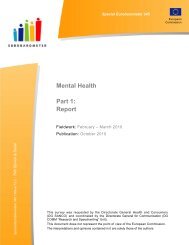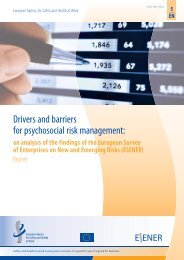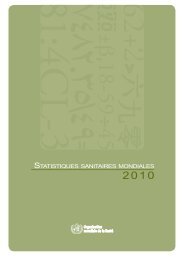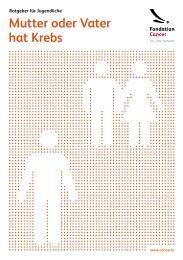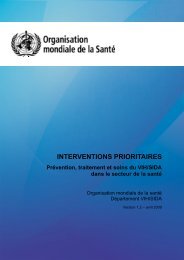healthy and active ageing - EuroHealthNet's Healthy Ageing Website
healthy and active ageing - EuroHealthNet's Healthy Ageing Website
healthy and active ageing - EuroHealthNet's Healthy Ageing Website
Create successful ePaper yourself
Turn your PDF publications into a flip-book with our unique Google optimized e-Paper software.
5. KEY AREAS FOR HEALTH PROMOTION<br />
AMONGST “YOUNGER OLDER PEOPLE”<br />
Those health promotion policies <strong>and</strong> programmes that are targeted at or relevant to people in the EU<br />
that are 50+ tend to focus on employment <strong>and</strong> employment conditions, the transition into retirement <strong>and</strong><br />
activities that they can take part in to stay <strong>active</strong>, up to date <strong>and</strong> socially connected following retirement.<br />
People aged 50+ should adopt good nutrition habits <strong>and</strong> engage in physical activity. This group should also<br />
utilise healthcare services, which are able to address their specific needs, on a regular basis. In addition,<br />
people in this age group are often ‘carers’ of youth <strong>and</strong> of older people, <strong>and</strong> may need assistance coping<br />
with these roles. This section provides information on these different topics on the basis of studies that have<br />
been conducted across Europe. It will address:<br />
A: Employment at transition into retirement<br />
B: Participation/social inclusion, including engagement in voluntary work <strong>and</strong> mental health<br />
C: Life-long learning <strong>and</strong> e-inclusion<br />
D: Physical activity <strong>and</strong> nutrition<br />
E: Utilisation of health services <strong>and</strong> intake of medication<br />
F: Carers<br />
Further examples of projects <strong>and</strong> programmes from EU countries <strong>and</strong> Canada addressing these topics are<br />
included in the compendium following this section.<br />
A. Employment <strong>and</strong> transition into retirement<br />
Given demographic change <strong>and</strong> <strong>ageing</strong> populations, there is a strong focus at EU level <strong>and</strong> in EU Member<br />
States on labour policies amongst those nearing retirement age. Many governments are developing<br />
policies <strong>and</strong> programmes to encourage people to work longer to help address the pressure on the younger<br />
generation. Organisations like AGE Platform Europe, however, stress that the debate around <strong>active</strong> <strong>ageing</strong><br />
should not focus exclusively on prolonging working careers to lighten pressure on public budgets, but<br />
should aim at making a society where everyone is empowered to participate at all ages. 25 The EU have<br />
adopted this approach <strong>and</strong> dedicated 2012 as the European Year (EY2012) for Active <strong>Ageing</strong> <strong>and</strong> Solidarity<br />
Between Generations (see Box 2). The EY2012 will focus on advocating for a society for all ages but in<br />
terms of <strong>ageing</strong>, the year will encourage older people to stay in the workforce <strong>and</strong> share their experiences;<br />
keep playing an <strong>active</strong> role in society <strong>and</strong> live as <strong>healthy</strong> <strong>and</strong> fulfilling lives as possible.<br />
There are many health-related reasons to encourage people to work longer. While work can be dem<strong>and</strong>ing<br />
<strong>and</strong> compete with family time <strong>and</strong> leisure activities, employment also makes people feel like valued members<br />
of <strong>and</strong> connected to society. Analysis of data from the Survey of Health <strong>and</strong> <strong>Ageing</strong> in Europe (SHARE)<br />
(See Box 12) on 11,462 participants who were 50-64 years old in ten countries found that perceived poor<br />
health was strongly associated with non-participation in the labour force in most European countries. 26<br />
Lower educational level, being single, physical inactivity, <strong>and</strong> high body mass index were associated with<br />
withdrawal from the labour force. Long-term illnesses such as depression, stroke, diabetes, chronic lung<br />
disease <strong>and</strong> musculoskeletal disease were significantly more common in those not having paid employment.<br />
The authors therefore concluded that social policies to encourage employment among older people should<br />
incorporate the role of preventing ill health <strong>and</strong> its influencing/contributing factors.<br />
Nevertheless, encouraging older people to continue to engage in full-time work might not be desirable. The<br />
Multilinks project (see Box 13), co-funded by DG Research, surveyed the opinions of Europeans in 23 EU<br />
25 Statement by Anne-Sophie Parent, Director of the AGE Platform Europe at the 3 rd EU Demography Forum in Brussels, 23 November 2010.<br />
26 Unemployment <strong>and</strong> retirement <strong>and</strong> ill-health: a cross-sectional analysis across European countries<br />
(Alavinia SM, Burdof A. Int Arch Occup Environ Health 2008; 82: 39-45<br />
23



